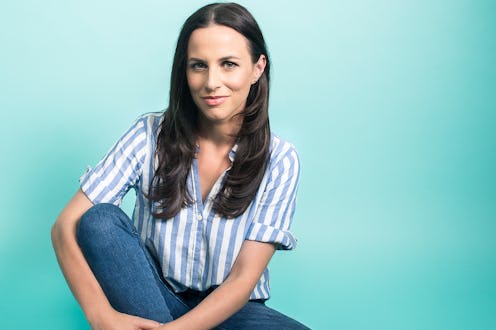News
Why I Wanted To Make Bustle's New Podcast, 'Latina To Latina'

As a television host at a channel aimed at Latinx TV viewers, I interviewed a lot of Latina celebrities and newsmakers. In on-air interviews, we’d talk about their recent projects and the issues they were passionate about, and then, after the lights dimmed and our mics were pulled off, the real conversation began.
How are you really? How is your career? Are you getting what you want? Are you getting what you need? What can I do to help?
In my conversations with other Latinas, they told me about challenges everywhere. People in business, politics, and tech were being passed over for promotions or being offered deputy-level jobs (even though they had already done senior-level work). Actors were told they weren’t the “right type” of Latina. Many of us in media were getting the sense that newsrooms only had room for a few of us, or that we would only be considered for the “Latinx beat.”
"While I was growing up, I didn’t realize that schoolchildren across America didn’t listen to La Mega on the bus ride to school, or learn Jose Martí poems in the second grade."
Of course, even if a lot of us are experiencing these obstacles, there are also Latinas working around them: creating their own content, launching their own ventures, and tackling these challenges head-on. Even when our off-camera questions didn't have answers or inspire specific changes, it was reassuring just to know we aren’t alone. The more access I’ve had to these people in real life, and the more I’ve benefited from their advice and their honesty, the more I’ve wished I could share those conversations. Now, I can. My new podcast, Latina to Latina, celebrates amazing, aspirational Latinas and all their hard-earned wisdom.
There’s No Such Thing As The “Right” Kind Of Latina
No single person could capture the complexity and breadth of being Latina. My experience is singular: I grew up in Union City, New Jersey, a predominantly Latinx immigrant enclave, and the most densely populated city in America. My dad is Cuban-American, the first person in his family to be born in the United States, and my mother is descended from Irish, German, and Norwegian immigrants, some of the first waves of immigrants to call Union City home. My classmates were Colombian, Salvadoran, Puerto Rican, Dominican, Cuban. We were different, but bound together by the reality of growing up in a place where almost everyone was from somewhere else.
"Living in a working class, immigrant community, I was also aware of the ways in which my experience did not reflect my classmates'."
While I was growing up, I didn’t realize that schoolchildren across America didn’t listen to La Mega on the bus ride to school, or learn Jose Martí poems in the second grade. I didn’t know that everyone’s hometown wasn’t constantly in flux — expanding to let new waves of immigrants in and contracting to let the ones who had “made it” out.
Living in a working class, immigrant community, I was also aware of the ways in which my experience did not reflect my classmates'. I had two college-educated, English-speaking, U.S. citizen parents in a place where those privileges were rare. Throughout my adolescence and early adulthood, I have navigated what it means to be Latina when I speak Spanish like I learned it in high school, when my appearance allows me to “pass” in majority-white spaces, when I have been granted the privilege of U.S. citizenship and have never been called upon to prove my “Americanness.”
Why I’m Making My Private Conversations Public
The goal of Latina to Latina is to take those intimate, honest conversations I have with other Latinas in private and share them with you. We talk about work and how these superstars got to be where they are, what they’ve learned along the way, and what they hope to do next. We talk about the causes and ideas that are on their minds — everything from colorism and homophobia in our own community to reimagining the systems that keep us out in a way that lets us — and everyone else — in. Plus, we’ll also talk about the stuff that we often avoid: sexuality, heartbreak, and how we move through the world when the way we see ourselves is different from how everyone else does.
I wish I’d had Latina to Latina when I felt alone and overwhelmed. Access to people who have made it (or are on their way) and hearing what it is really like to be the first or the only would have made all the difference for me. I certainly hope it does for you.
Listen To Episode #1 Of Latina To Latina Featuring Jackie Cruz
You can listen to the first episode, featuring an incredible conversation with Orange Is the New Black’s Jackie Cruz, right here. You can also read the full transcript of that episode here. Starting April 10, every Tuesday there will be a new episode of Latina to Latina that will center on the challenges of existing, and then thriving, as women of color.
Subscribe on iTunes, share with your friends, and please reach out — we want to know what you love about Latina to Latina, who you'd like to hear from next, and how you feel about the issues we’ve covered. You can email us at latinatolatina@bustle.com.